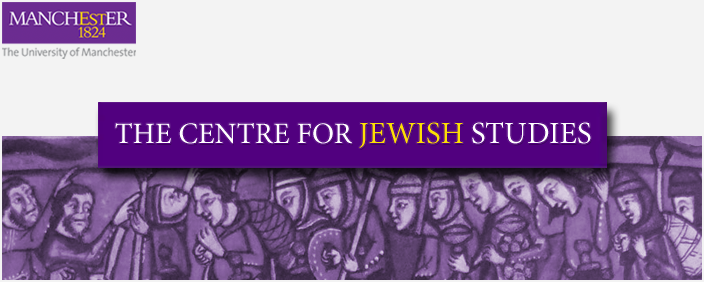‘Encountering Others, Encountering Ourselves’:
Reflexivity and the Jewish Studies Researcher
Centre for Jewish Studies Sherman Conversation
Thursday 11 January 2024
Graduate School of Arts, Languages and Cultures, University of Manchester
The application process is now closed.
For questions, contact Lindsey Taylor-Guthartz, lindsey.taylor-guthartz@manchester.ac.uk, or Katja Stuerzenhofecker, katja.stuerzenhofecker@manchester.ac.uk
This workshop seeks to explore collaboratively and reflexively our positions as Jewish Studies researchers in relation to the Jewish subjects we study. Some researchers identify as Jewish themselves but are outsiders to the Jewish community they study. Others do not identify as Jewish but are insiders in other respects that are significant to their research, e.g. gender, sexuality, disability or nationality. The wide range of possible insider-outsider constellations poses challenges and opportunities that shape the research process and the researcher’s personal and professional development. Inspired by a workshop on ‘Insider Ethnography with Jewish Communities’ held at Syracuse University in the USA in 2022, we hope this day of collaborative work will facilitate further exchange between scholars across the spectrum of insider-outsider positions in Jewish Studies. We will explore the ethics, tensions and practicalities arising from our insider-outsider positions, broadly defined as a continuum on which we find ourselves, sometimes in several positions concurrently.
Some of the questions we hope to explore:
- What are the essential ways in which ‘insider’ and ‘outsider’ research might differ?
- Who counts as an ‘insider’ and what complications might this status entail?
- Is the 'boundary' between 'outsiders' and the Jewish subjects they are studying porous? If so, under what conditions and with what implications can it be crossed?
- What is our ethical duty as researchers to communities of which we are 'insiders'? Do they differ from the duties of those who are 'outsiders'?
- What personal safety issues arise for us when we research our own communities? Can we ever be 'off duty'?
- Is our research intended for those we study, the scholarly world, or anyone else, and how do we manage to present it in front of different audiences?
- How do different pressures from our own mix of identities (scholar, Jewish or non-Jewish heritage, nationality, etc.) affect, shape, and steer our research?
- What are the implications of publishing research on communities in which we are ‘insiders’?
- How can we share research with participants and communities in a way that acknowledges that academic and non-academic understandings of data may differ
- What funding concerns might we need to be aware of? What impacts on academic freedom might be generated by funding that comes from ‘inside’ the community?
The workshop will bring together researchers at all career stages working in Jewish Studies, broadly defined as scholarly engagement with Jewish subjects, past and present. In four sessions, spread over a single day, we will examine the themes that emerge from participants’ case studies of their positionality as a researchers. We will discuss strategies for constructive engagement with the strengths, limitations and potential of our positions in a mutually supportive and confidential environment. The day’s conversations will be facilitated as action learning sets, a peer learning process well established in professional development and higher education. Action learning sets enable participants to reach a deeper understanding of their positionality and how to negotiate it. The process employs Socratic questioning by the group in response to participants’ description of their own research experiences The aim of action learning sets is for participants to work towards their personal action plan. The process will be introduced in full on the day. For further information on action learning sets, see McGill and Beaty (2001). Action learning: a guide for professional, management & educational development. Rev. 2nd ed. London: Kogan Page.
We hope to explore the potential to form a researcher network after the event.
Attendance and refreshments throughout the event are free. We are able to offer a small number of bursaries for travel and accommodation for selected participants with particular financial needs.
Places are limited and the organizers have selected participants to ensure a varied range of career stages and insider-outsider positionalities.



